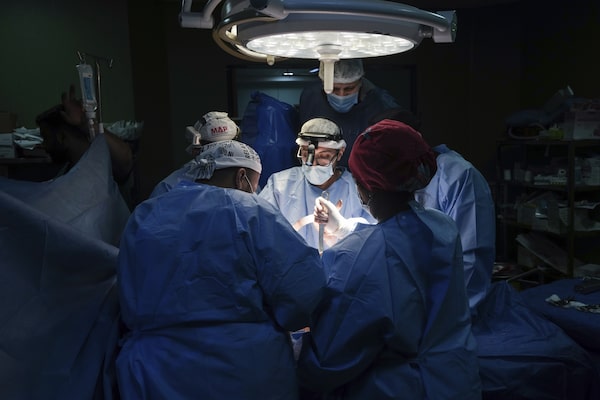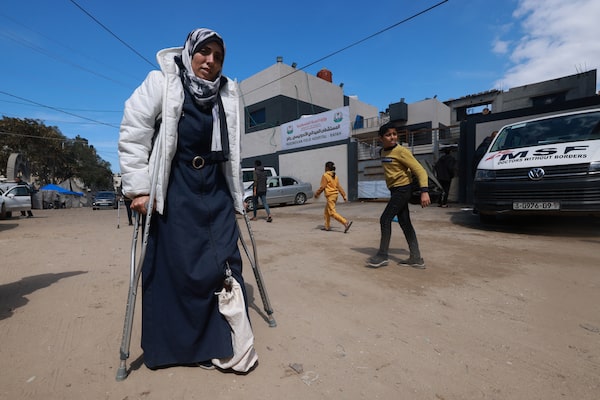Nurses in Bologna treat amputee Shaymaa Shady, 5, one of a group 16 young Palestinians airlifted to hospitals in Italy. Shaymaa had her first amputation in January after an explosion in Gaza, where her prospects for recovery are not good as war strains the health-care system.Nariman El-Mofty/The New York Times
First came the crushed bones, seared skin and soft tissue gouged by shrapnel from Israel’s intense bombing campaign in Gaza, which has injured many more than it has killed.
Then came the infections. For some, amputation has followed. Others have died.
Roughly a third of Gaza’s hospitals have continued to provide acute care through more than six months of war, with medical personnel working to provide life-saving interventions to those not killed by aerial attacks.
But doctors and aid workers say the often lengthy healing process has created a new set of medical difficulties, as the wounded struggle to secure proper medication and maintain hygiene in crowded camps.
Palestinian health authorities have counted nearly 34,000 dead but say more than 76,000 people have been injured.
Hospitals able to provide surgeries, set broken bones and stop bleeding have little space to keep patients after their initial care.
“Those that are lucky with lesser wounds might heal. But those who have serious wounds or untreated fractures – they can only worsen,” said Federico Dessi, a regional director for French aid group Humanity & Inclusion who recently returned from 12 days in Gaza. “That can lead to an amputation, or sometimes even to death if they get septicemia.”
Palestinian journalist Sami Shehada, wounded in an Israeli strike, lies on the floor at Deir Al-Balah's Al-Aqsa hospital.Doaa Rouqa/Reuters
Some lose limbs because they are too badly damaged. For others, amputation is a rapid but devastating medical response when doctors are overwhelmed with casualties. Still others are unable to access the specialized care that would save arms and legs.
Accurate figures are not available from Gaza. But as many as 1,000 children have had limbs amputated, said Mohammed Shaheen, an orthopedic surgeon at al-Aqsa Martyrs Hospital in Deir al-Balah. “The number is too high,” he said. He has seen triple and even quadruple amputations.
Those who have lost limbs “need specific care and close follow-up and management, because they are highly susceptible to infection,” Dr. Shaheen said. But operating theatres and emergency rooms can lack the capacity to help. “On some days, we can’t bring these patients into the operating room because all of the rooms are full of emergency patients that need urgent operation.”
Nurses struggle to manage the immense numbers of people in need of care. Specialists aren’t always available.
“We lack vascular surgeons,” said Guillemette Thomas, the Médecins sans frontières medical co-ordinator for Gaza and the West Bank. “When you need vascular surgery to save the limbs and you don’t have that, you have to amputate at some points.” Even when the surgery is done perfectly, “follow-up is extremely challenging, because people are totally lost in the middle of thousands of people,” some of them seeking refuge in hospitals, she said.
In the early days of the war, medical providers could offer patients wound kits with gauze and disinfectants such as iodine. Supplies of such kits, however, have long since run out, as have medications in many pharmacies, Dr. Thomas said.
MSF now operates five primary health centres in Gaza that can provide wound care. It opened a hospital in Rafah late last year to help with outpatient care, such as dressing changes. It is reopening a clinic in Gaza City for the fourth time.
But an injured person who returns to their family might struggle to find transportation back to a clinic. With nearly two million internally displaced people in Gaza, many face further problems in elements of basic wound care, such as maintaining cleanliness in heavily crowded environments with limited access to clean water and bathing facilities.

At hospitals like this one in Deir al-Balah, surgeons must make do with limited resources, as must patients who need basic wound care once they are discharged.Abdel Kareem Hana/The Associated Press
Even when excellent medical care is available, preventing bone infection in people struck by bullets can take years of intensive medical intervention. Difficulties in recovery from injuries have only been exacerbated by near-famine conditions, with 1.1 million people in Gaza “experiencing catastrophic food insecurity,” according to the United Nations Relief and Works Agency.
Doctors, meanwhile, have limited access to even basic tools. Hospital laboratory capacity has collapsed, leaving little ability to access testing that could help identify which antibiotic is best to treat an infection. Hospital regimes for infection control have struggled against the sheer numbers seeking care.
Heavy Israeli scrutiny of medical imports to Gaza has added further complications. Antibiotics were caught in shipments that were delayed because Israeli authorities barred the import of an unrelated medical device on the same truck.
Other blocked items are directly related to the prevention of infections, including an autoclave that uses pressurized steam to sterilize medical equipment. “It has been rejected at the border,” Dr. Thomas said.
Unnecessary amputation of limbs, she said, adds to the long-term toll of the war, creating not just physical impairment and domestic economic consequences but lasting psychological damage. “Each time you see your missing limb you will remember what has happened,” she said.

Maha Abo Naja walks on crutches outside the Rafah clinic where she's being treated for injuries from an Israeli bombardment.MOHAMMED ABED/AFP via Getty Images
War has left amputees with limited capacity to support themselves. Anyone seeking to fashion a crutch from wood, for example, must consider whether that wood is needed as cooking fuel. Humanity & Inclusion, which was initially formed to help Cambodian land mine victims, has distributed crutches in Gaza where it can, but “we’re only reaching a fraction of people now,” Mr. Dessi said.
Bassam Shaheen, a 38-year-old father of three, is among those now navigating life without a limb. He was badly hurt in an attack while he was moving between his home and a shelter. Doctors tried to care for worsening injuries to his left leg, but the available medication was limited largely to analgesics. At one point, his care was interrupted by an Israeli raid that forced him to move to another hospital.
“Doctors in the two hospitals tried their best to save my leg,” he said. Ultimately, they told him amputation was needed to save his life.
Fifty days after he was injured, he agreed. He remains in hospital recovering, thinking about whether he will ever return to work as a truck driver. “I hope the war ends,” he said, “so I can get a prosthetic leg.”
Israel-Hamas war: More from The Globe and Mail
When Israeli air strikes killed seven aid workers in Gaza this month, it underscored how dangerous it is to bring essential supplies to Palestinians in wartime. Sarah Schiffling, an expert in humanitarian logistics, spoke with The Decibel about what can be done to send help more easily. Subscribe for more episodes.
Pressure grows to change ‘made in Israel’ labels on goods from West Bank settlements